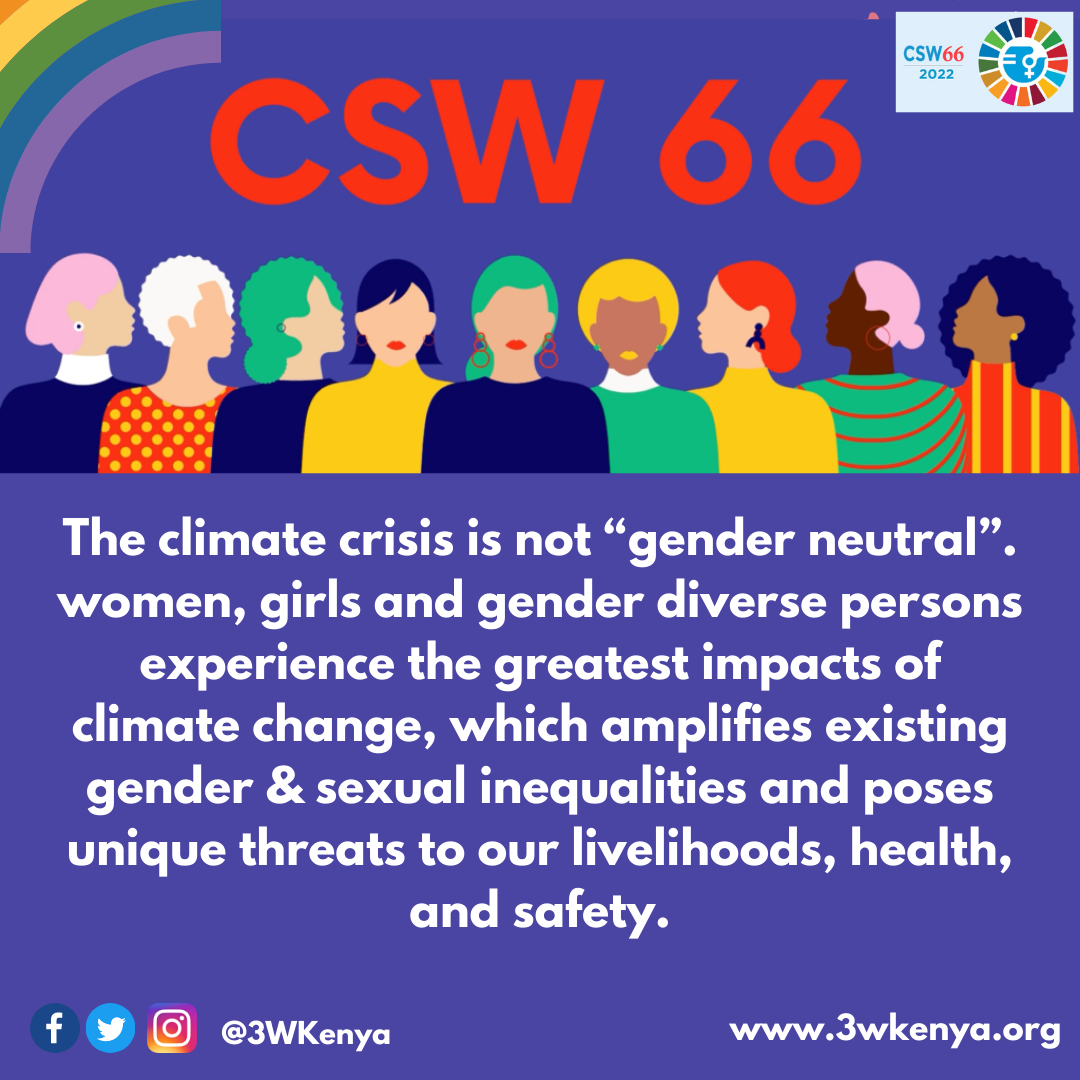Commission on the Status of Women (CSW66)
Have you heard of the #CSW66? Wonder what it is all about? Worry no more!
CSW66 FAQS
2022 marks the sixty-sixth session of the Commission on the Status of Women hence #CSW66. The Commission on the Status of Women (CSW) is the principal global intergovernmental body exclusively dedicated to the promotion of gender equality and the empowerment of women. A functional commission of the Economic and Social Council (ECOSOC), it was established by ECOSOC resolution 11(II) of 21 June 1946. The CSW is instrumental in promoting women’s rights, documenting the reality of women’s lives throughout the world, and shaping global standards on gender equality and the empowerment of women.
The priority theme of CSW66 is “Achieving gender equality and the empowerment of all women and girls in the context of climate change, environmental and disaster risk reduction policies and programmes. Reasons being :-
- Gender inequality coupled with climate and environment crises is the greatest sustainable development challenge of the present time. Climate change, environmental degradation and disasters affect the entire planet and all peoples, although not in the same way or to the same degree, while gender inequality results in the denial of full human rights to half of humanity. Climate change and environmental crises and disasters disproportionately affect women and girls, in particular those in vulnerable and marginalized situations. In turn, gender inequality and the unequal access of women to land and natural resources, finance, technology, knowledge, mobility and other assets constrain the ability of women to respond and cope in contexts of climate and environmental crises and disasters. The economic and social fallout of the coronavirus disease (COVID-19) pandemic has compounded the impacts of the climate and environment crises and pushed people further behind, women and girls disproportionately so. The capacity of women and girls to take action and build a resilient future depends on removing structural barriers and gender gaps, while the participation and leadership of this group are critical for making climate, environmental and disaster risk action more effective.
- Climate and environmental crises and disasters can curtail the sexual and reproductive health and rights of women and girls when goods and services are limited or unavailable owing to the destruction of infrastructure, roads and clinics, in rural and remote areas in particular. Entrenched gender discrimination compounds the risks for young women and adolescent girls and gender-diverse persons.
- The shadow pandemic of violence against women and girls during COVID-19 exemplifies the surge of gender-based violence that occurs in crises and disasters, Women and girls facing multiple and intersecting forms of discrimination in particular are subject to violence and exclusion. The increase in femicides and threats and violence against women environmental human rights defenders, including indigenous women, is alarming.
Also it’s important to note that sexual and gender minorities are globally vulnerable to the effects of climate change. The consequences of climate change have global reach, the effects are not equally divided. It is well-documented that those of us marginalized tend to suffer the most from the consequences of climate change. Sexual and gender minorities are one of these marginalized groups. The vulnerabilities that come with being a sexual or gender minority, such as social exclusion and stigma, violence, discrimination, hate crimes and general social vulnerability, are only enhanced due to the effects of climate change, including limited access to social services, healthcare services, education and infrastructure.
Realizing gender equality and the rights and empowerment of women,girls and gender diverse persons is essential for the full, effective and accelerated implementation of the Beijing Declaration and Platform for Action and the 2030 Agenda for Sustainable Development. Advancing gender equality and the empowerment of women in the context of climate change, environmental degradation and disaster risk reduction requires holistic and integrated policies and programmes that uphold rights, build resilience and foster regenerative green and blue economies and gender-responsive, just transitions.
https://www.unwomen.org/en/csw
Outcomes, UN Women: http://www.unwomen.org/en/csw/outcomes.
https://www.unwomen.org/en/news-stories/explainer/2022/02/explainer-how-gender-inequality-and-climate-change-are-interconnected




